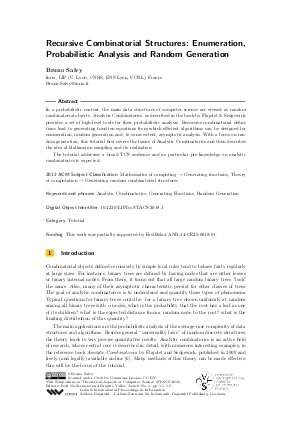Recursive Combinatorial Structures: Enumeration, Probabilistic Analysis and Random Generation
Author Bruno Salvy
-
Part of:
Volume:
35th Symposium on Theoretical Aspects of Computer Science (STACS 2018)
Part of: Series: Leibniz International Proceedings in Informatics (LIPIcs)
Part of: Conference: Symposium on Theoretical Aspects of Computer Science (STACS) - License:
 Creative Commons Attribution 3.0 Unported license
Creative Commons Attribution 3.0 Unported license
- Publication Date: 2018-02-27
File

PDF
LIPIcs.STACS.2018.1.pdf
- Filesize: 402 kB
- 5 pages
Document Identifiers
Subject Classification
Keywords
- Analytic Combinatorics
- Generating Functions
- Random Generation
Metrics
- Access Statistics
-
Total Accesses (updated on a weekly basis)
0Document
0Metadata
Abstract
In a probabilistic context, the main data structures of computer science are viewed as random combinatorial objects. Analytic Combinatorics, as described in the book by Flajolet and Sedgewick, provides a set of high-level tools for their probabilistic analysis. Recursive combinatorial definitions lead to generating function equations from which efficient algorithms can be designed for enumeration, random generation and, to some extent, asymptotic analysis. With a focus on random generation, this tutorial first covers the basics of Analytic Combinatorics and then describes the idea of Boltzmann sampling and its realisation. The tutorial addresses a broad TCS audience and no particular pre-knowledge on analytic combinatorics is expected.
Cite As Get BibTex
Bruno Salvy. Recursive Combinatorial Structures: Enumeration, Probabilistic Analysis and Random Generation. In 35th Symposium on Theoretical Aspects of Computer Science (STACS 2018). Leibniz International Proceedings in Informatics (LIPIcs), Volume 96, pp. 1:1-1:5, Schloss Dagstuhl – Leibniz-Zentrum für Informatik (2018)
https://doi.org/10.4230/LIPIcs.STACS.2018.1
BibTex
@InProceedings{salvy:LIPIcs.STACS.2018.1,
author = {Salvy, Bruno},
title = {{Recursive Combinatorial Structures: Enumeration, Probabilistic Analysis and Random Generation}},
booktitle = {35th Symposium on Theoretical Aspects of Computer Science (STACS 2018)},
pages = {1:1--1:5},
series = {Leibniz International Proceedings in Informatics (LIPIcs)},
ISBN = {978-3-95977-062-0},
ISSN = {1868-8969},
year = {2018},
volume = {96},
editor = {Niedermeier, Rolf and Vall\'{e}e, Brigitte},
publisher = {Schloss Dagstuhl -- Leibniz-Zentrum f{\"u}r Informatik},
address = {Dagstuhl, Germany},
URL = {https://drops.dagstuhl.de/entities/document/10.4230/LIPIcs.STACS.2018.1},
URN = {urn:nbn:de:0030-drops-85352},
doi = {10.4230/LIPIcs.STACS.2018.1},
annote = {Keywords: Analytic Combinatorics, Generating Functions, Random Generation}
}
Author Details
References
-
F. Bergeron, G. Labelle, and P. Leroux. Combinatorial species and tree-like structures. Number 67 in Encyclopedia of Mathematics and its Applications. Cambridge University Press, Cambridge, 1998. Translated from the 1994 French original by Margaret Readdy, With a foreword by Gian-Carlo Rota.

-
H. Décoste, G. Labelle, and P. Leroux. Une approche combinatoire pour l'itération de Newton-Raphson. Advances in Applied Mathematics, 3(4):407-416, 1982.

-
Philippe Duchon, Philippe Flajolet, Guy Louchard, and Gilles Schaeffer. Boltzmann samplers for the random generation of combinatorial structures. Combinatorics, Probability and Computing, 13(4-5):577-625, 2004. Special issue on Analysis of Algorithms.

-
Philippe Flajolet, Éric Fusy, and Carine Pivoteau. Boltzmann sampling of unlabelled structures. In David Applegate, Gerth Stølting Brodal, Daniel Panario, and Robert Sedgewick, editors, Proceedings of the Ninth Workshop on Algorithm Engineering and Experiments and the Fourth Workshop on Analytic Algorithmics and Combinatorics, volume 126 of SIAM Proceedings in Applied Mathematics, pages 201-211. SIAM, 2007. Workshops held in New Orleans, LA, January 6, 2007.

- Philippe Flajolet, Bruno Salvy, and Paul Zimmermann. Automatic average-case analysis of algorithm. Theor. Comput. Sci., 79(1):37-109, 1991. URL: http://dx.doi.org/10.1016/0304-3975(91)90145-R.
-
Philippe Flajolet and Robert Sedgewick. Analytic Combinatorics. Cambridge University Press, 2009. 824 pages (ISBN-13: 9780521898065); also available electronically from the authors' home pages.

-
Marni Mishna. Attribute grammars and automatic complexity analysis. Advances in Applied Mathematics, 30(1):189-207, 2003.

- Carine Pivoteau, Bruno Salvy, and Michèle Soria. Algorithms for combinatorial structures: Well-founded systems and newton iterations. J. Comb. Theory, Ser. A, 119(8):1711-1773, 2012. URL: http://dx.doi.org/10.1016/j.jcta.2012.05.007.
- Joachim von zur Gathen and Jürgen Gerhard. Modern computer algebra. Cambridge University Press, New York, 2nd edition, 2003. URL: http://www.cambridge.org/fr/knowledge/isbn/item1170826.
